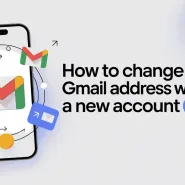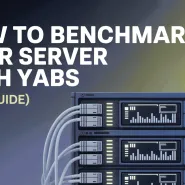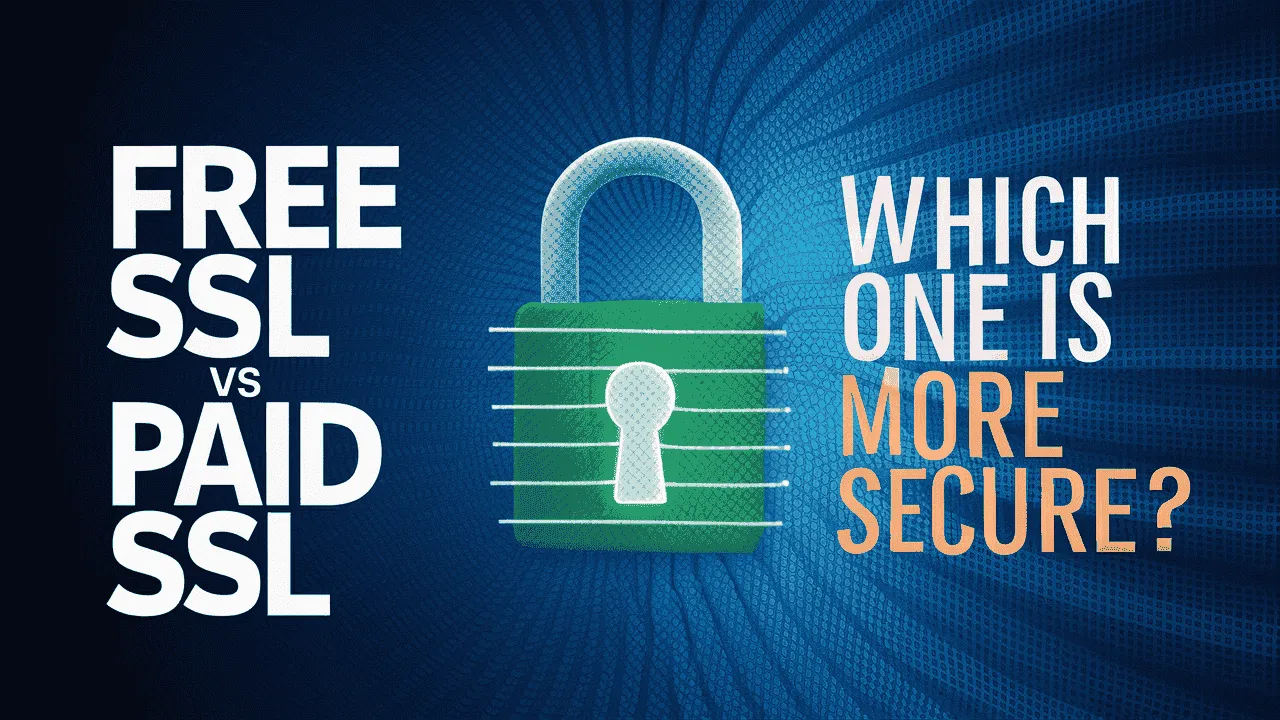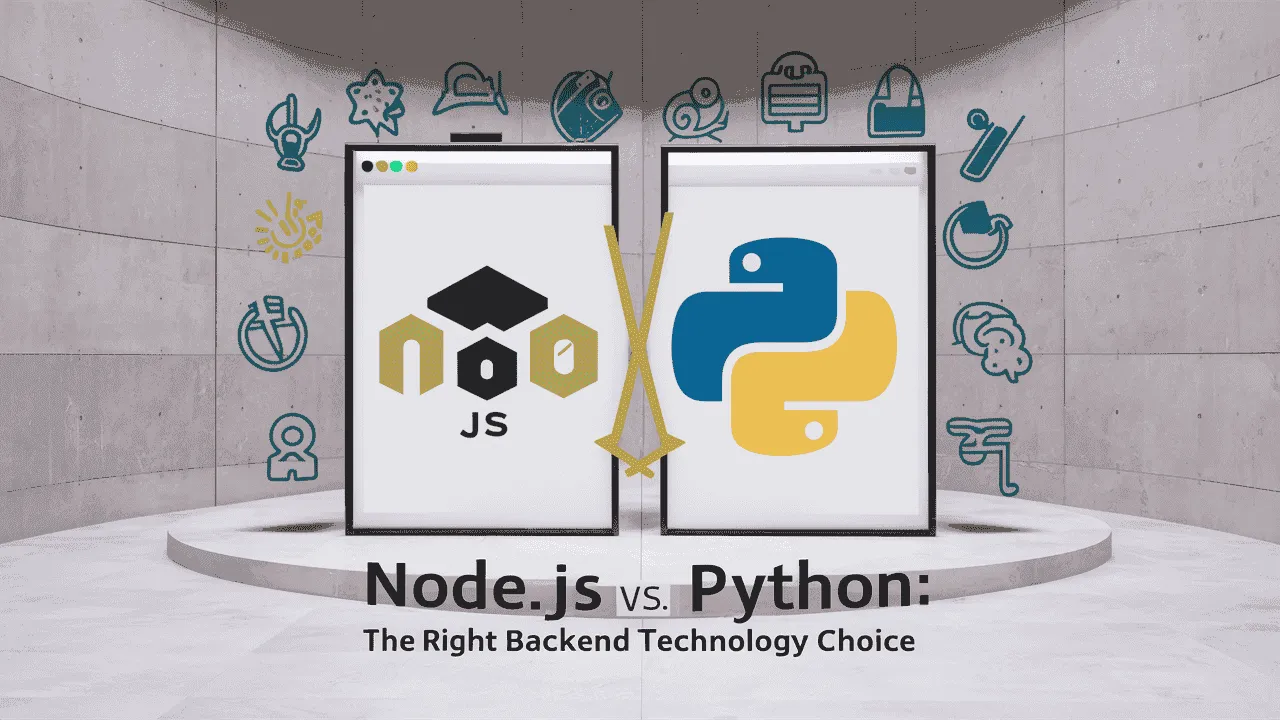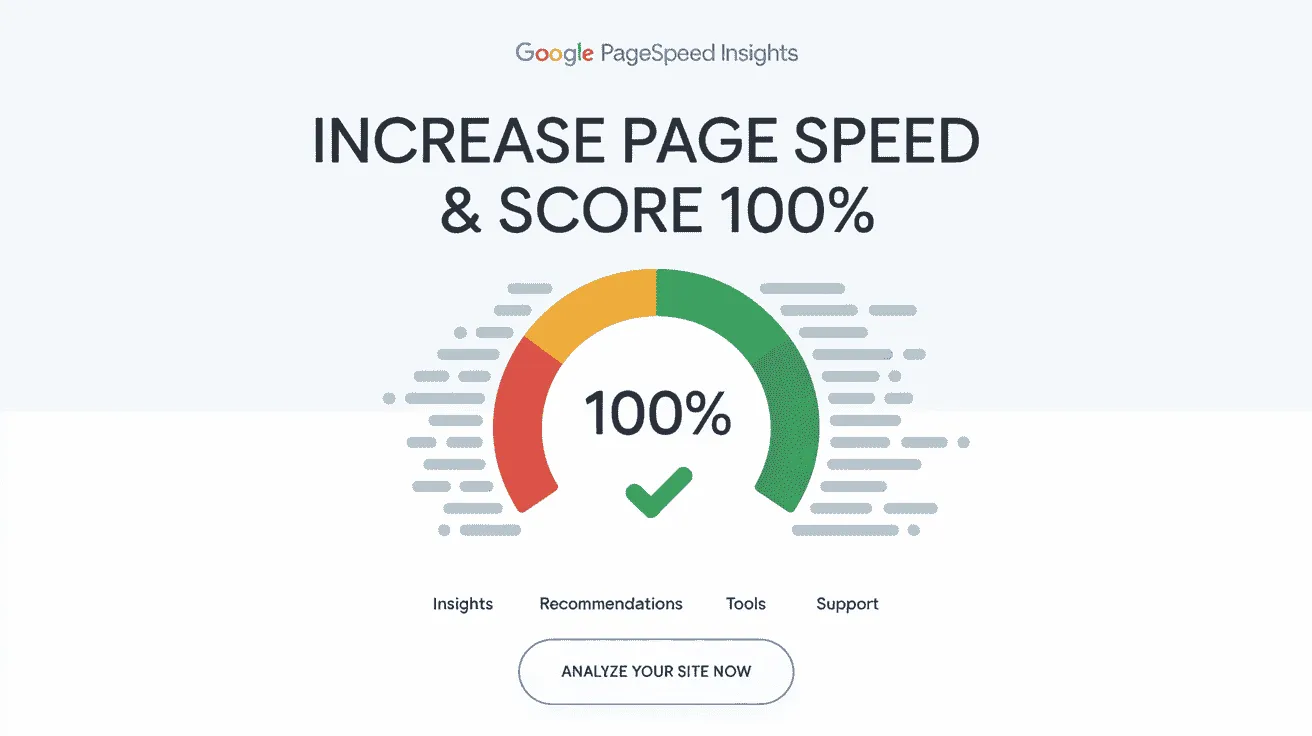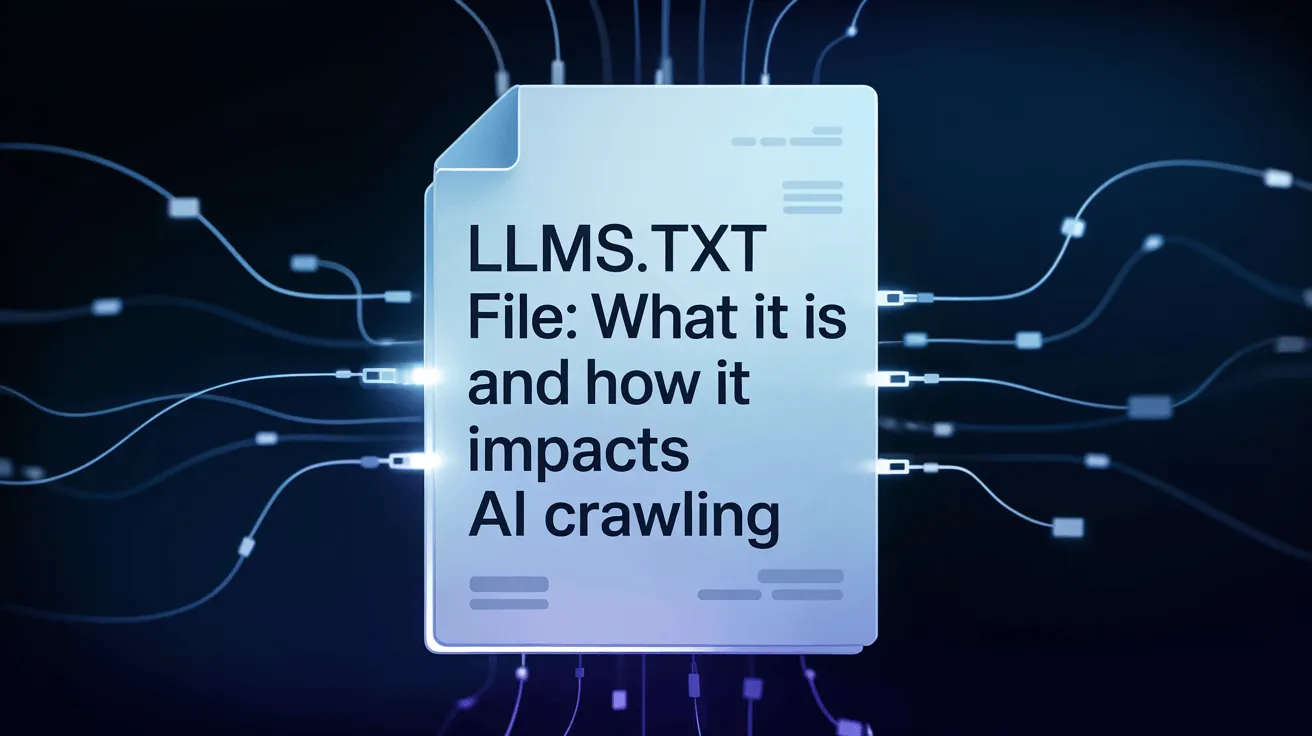Online safety is more important than ever. That’s why the topic of Free SSL vs Paid SSL Certificate is becoming so important in 2025. Business owners and website creators often ask the key question: Which one is more secure: Free SSL vs Paid SSL? An SSL (Secure Socket Layer) certificate protects the information shared between your website and your visitors by encrypting it, making sure no one can steal sensitive data. But still, many wonder — Which one is more secure: Free SSL vs Paid SSL?
Free SSL vs Paid SSL Certificate is not just a matter of price anymore. Free SSL certificates, like those offered by Let’s Encrypt, are popular because they’re easy to set up and completely free. They are a good option for personal websites or small projects. But the question remains — Which one is more secure: Free SSL vs Paid SSL?
Paid SSL certificates come with added benefits like better support, warranty coverage, and a higher level of trust from visitors. So when comparing Free SSL vs Paid SSL Certificate, the added features of paid versions can make a big difference for businesses. That’s why more and more people are asking — Which one is more secure: Free SSL vs Paid SSL?
As we continue to explore the topic of Free SSL vs Paid SSL Certificate in 2025, it’s clear that each type of SSL serves a purpose. The real answer to Which one is more secure: Free SSL vs Paid SSL depends on what kind of website you have and how much trust and protection you need. This guide by Owrbit is here to help you understand the differences so you can make the right choice for your website and stay safe in today’s internet world.

Introduction to SSL Certificates :
SSL stands for Secure Socket Layer. It’s a technology used to keep websites and their visitors safe by encrypting the data exchanged between a user’s browser and the website. This encryption ensures that sensitive details like passwords, credit card numbers, and personal information stay private and protected from hackers.
When a website uses an SSL certificate, you’ll notice a padlock icon next to the URL in the browser, and the address will start with “https” instead of “http.” This indicates that the site is secure and trusted by web browsers.
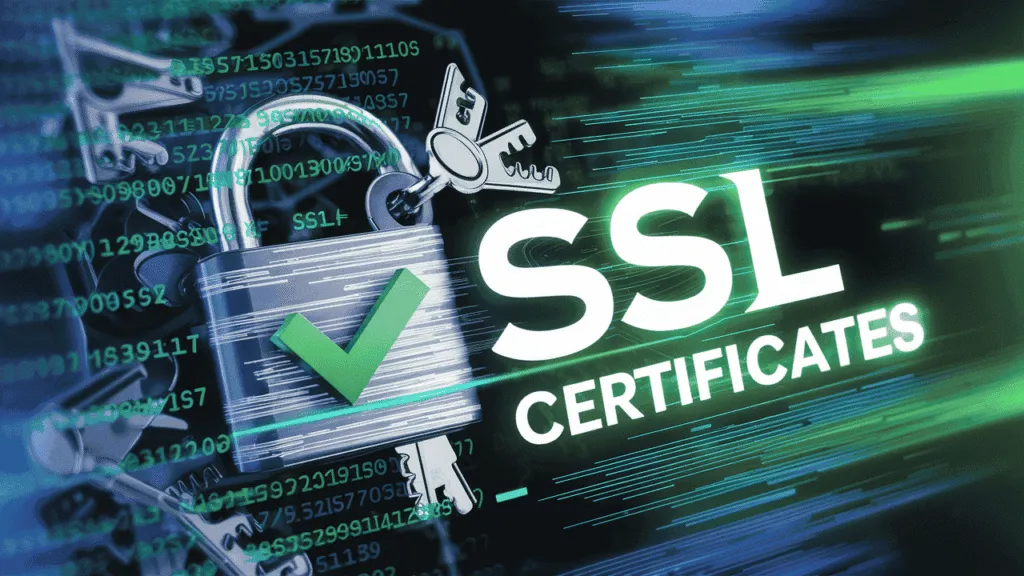
In 2025, having an SSL certificate is essential for all types of websites—from personal blogs to large e-commerce platforms. Not only does it improve security, but it also boosts user trust and search engine ranking.
However, this brings up a common question for website owners: should you choose a free SSL certificate or invest in a paid one? The debate over free SSL vs paid SSL certificate is more relevant than ever. While both options provide basic encryption, they differ in terms of features, support, and trust level.
This guide will help you understand the key differences and answer the important question: which one is more secure: free SSL vs paid SSL? By the end, you’ll be better equipped to choose the right SSL certificate for your website.
Importance of SSL in Website Security :
SSL certificates have become a must-have for any website. Here’s why they are so important for keeping your website safe and trustworthy:

- Data Encryption – SSL encrypts the data between your website and your visitors, making it unreadable to hackers or third parties.
- User Trust – Visitors feel more comfortable browsing or buying from your site when they see the secure padlock and “https” in the URL.
- Protection of Sensitive Information – SSL helps protect login credentials, payment information, contact forms, and any personal data users share.
- Improved SEO Ranking – Google and other search engines give a ranking boost to websites that are SSL-secured.
- Prevention of Data Breaches – SSL reduces the risk of data being stolen or tampered with during transmission.
- Compliance Requirements – For many online businesses, using SSL is necessary to comply with privacy laws and industry standards.
- Professional Image – A secure site gives a more professional appearance and builds customer confidence.
- Browser Warnings Avoided – Without SSL, browsers may show a “Not Secure” warning, which can scare users away.
Whether you go with a free SSL vs paid SSL certificate, having SSL in place is essential. The key question remains: which one is more secure: free SSL vs paid SSL? Understanding these points will help you make the right choice for your website’s safety and credibility.
Types of SSL Certificates :
There are two main types of SSL certificates that website owners can choose from: Free SSL vs Paid SSL. Both serve the same basic purpose—encrypting data and keeping your site secure—but they differ in features, support, and trust level.

Overview of Free SSL Certificates :
Free SSL certificates have become a popular choice among small website owners, bloggers, and beginners who want to secure their websites without spending any money. These certificates are easy to get and serve the main purpose of encrypting data between the website and its visitors. However, while they are useful, it’s important to understand their limitations when comparing free SSL vs paid SSL certificate and answering the question: which one is more secure: free SSL vs paid SSL?
Here are some key points about free SSL certificates:
- Offered by non-profit organizations like Let’s Encrypt and ZeroSSL.
- Provide basic domain validation (DV), which only verifies domain ownership.
- Completely free of cost and typically valid for 90 days (requires frequent renewal).
- Can be set up easily through most hosting providers with automatic renewal options.
- No customer support—users must rely on community forums or DIY troubleshooting.
- Do not come with warranties or financial protection in case of misuse or failure.
- Cannot be used for extended validation (EV) or organization validation (OV).
- Suitable for personal websites, small blogs, portfolios, and test projects.
Free SSL certificates are perfect for simple websites that don’t handle sensitive customer information. But when trust, brand identity, and advanced security are needed.
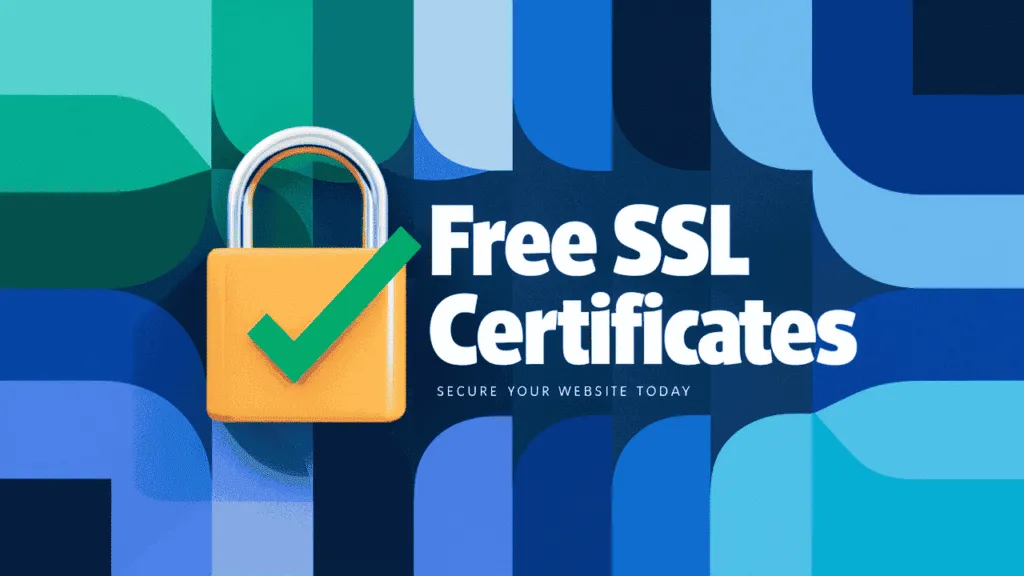
Use Cases for Free SSL Certificates :
Free SSL certificates are ideal for websites that need basic encryption without the need for advanced validation or premium features. Below are common scenarios where using a free SSL certificate makes practical sense:
- ✅ 1. Personal Blogs or Portfolios
- If you’re running a blog or personal website where users don’t share sensitive information, a free SSL ensures secure connections without added cost.
- ✅ 2. Informational or Non-Transactional Sites
- Websites that only display content (like articles or company info) and do not collect data or process payments can safely rely on free SSL for security and trust.
- ✅ 3. Testing or Staging Environments
- For developers working on staging servers or test environments, a free SSL offers encryption during development without the need to purchase a certificate.
- ✅ 4. Small Startups or Nonprofits with Budget Constraints
- Early-stage businesses or nonprofit organizations can use free SSL to establish basic website security while saving on initial costs.
- ✅ 5. Temporary or Short-Term Websites
- Free SSL is a good option for event sites, landing pages, or short campaigns that won’t stay live for long, as the cost and validation effort for paid SSL may not be justifiable.
Overview of Paid SSL Certificates :
Paid SSL certificates are designed for websites that need more than just basic security. They not only protect user data but also help build trust, especially for businesses, eCommerce platforms, and professional websites. When comparing free SSL vs paid SSL certificate, paid options offer advanced features that can make a big difference in how secure and credible your website appears. So, if you’re still asking which one is more secure: free SSL vs paid SSL, here’s what paid SSL brings to the table:
Key features of paid SSL certificates include:
- Offered by trusted certificate authorities like DigiCert, Sectigo, Comodo, and GeoTrust.
- Available in multiple types: domain validation (DV), organization validation (OV), and extended validation (EV).
- EV certificates display the business name in the address bar, adding more trust for users.
- Come with a warranty or insurance that protects against certificate misuse or fraud.
- Include professional support via chat, email, or phone, helpful during setup or issues.
- Validity typically lasts 1 year, with reminders and support for renewal.
- Useful for eCommerce sites, banks, customer login areas, and business websites handling sensitive data.
- May include trust seals or logos to display on your site, enhancing brand reputation.
Overall, paid SSL certificates offer a complete security solution along with added credibility. So, when considering free SSL vs paid SSL certificate, and asking which one is more secure: free SSL vs paid SSL, paid SSL is the better option for any site that requires higher trust, brand recognition, and professional support.

Use Cases for Paid SSL Certificates :
Paid SSL certificates are designed for businesses and websites that require higher levels of trust, validation, and advanced security features. Here are the most common scenarios where a paid SSL certificate is strongly recommended:
- ✅ 1. E-Commerce Websites
- Sites that handle online transactions and store customer payment details need the security and trust indicators offered by paid SSL (especially EV or OV certificates) to boost customer confidence.
- ✅ 2. Business or Corporate Websites
- Professional websites that represent a company or brand benefit from the identity validation that comes with paid SSL, showcasing authenticity and credibility.
- ✅ 3. Login Portals and Membership Platforms
- Websites that require user logins, such as SaaS platforms, forums, or intranets, should use paid SSL to protect user credentials and sensitive data.
- ✅ 4. Government and Educational Institutions
- These sectors often require compliance and enhanced security. Paid SSL ensures strong validation and encryption standards to meet those requirements.
- ✅ 5. Multi-Domain or Subdomain Management
- Organizations that manage multiple websites or subdomains can use paid SSL options like Multi-Domain (SAN) or Wildcard SSL certificates, which are not available with free SSL.
- ✅ 6. High-Traffic or SEO-Driven Sites
- Paid SSL often includes warranties, support, and uptime guarantees that help maintain performance and reputation for large-scale or SEO-optimized websites.
Different Types of Paid SSL Certificates :
Paid SSL certificates come in different types, depending on how many domains or subdomains you want to secure. Choosing the right one depends on your website setup and how many URLs you need protection for. Here’s a quick look at the three most common types:
1. Single Domain SSL Certificate
This type secures only one domain.
For example, it will cover www.example.com or example.com, but not any subdomains.
Key features:
- Ideal for small websites or blogs with just one main domain.
- Simple to set up and usually the most affordable option.
- Available in DV, OV, and EV types.
2. Wildcard SSL Certificate
This type secures one main domain and all of its subdomains.
For example, it covers example.com, blog.example.com, store.example.com, etc.
Key features:
- Saves money and time by covering unlimited subdomains with one certificate.
- Great for businesses running multiple services under the same domain.
- Available in DV and OV types (not available in EV).
3. Multi-Domain SSL Certificate (MDC)
Also called SAN (Subject Alternative Name) SSL, this type can secure multiple domains with a single certificate.
For example, it can secure example.com, example.net, example.org, and even store.example.co.in.
Key features:
- Perfect for companies managing several different domain names.
- Reduces the hassle of managing multiple certificates.
- Available in DV, OV, and EV types.
Each of these paid SSL certificate types serves different needs. So when you’re comparing free SSL vs paid SSL certificate and asking which one is more secure: free SSL vs paid SSL, keep in mind that only paid SSL offers this kind of flexibility and extended protection.
Security Features Comparison: Free SSL vs Paid SSL
When choosing between free SSL vs paid SSL certificate, it’s important to understand the key security features that each option provides. While both protect your site using encryption, there are differences that can affect trust and overall security. Let’s break it down:
Checkout How Get A Free SSL Certificate? Why Your Website Needs SSL?
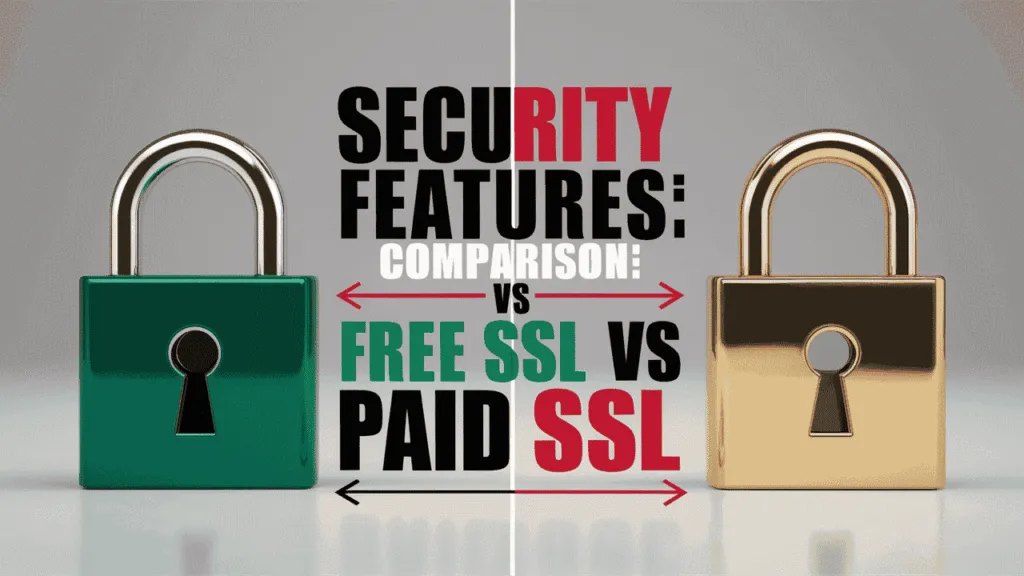
1. Encryption Levels: Free vs Paid SSL
When it comes to encryption, both Free SSL vs Paid SSL offer the same level of security. They use modern encryption standards to protect data transmitted between a user’s browser and the website. This ensures that sensitive information like login credentials, credit card numbers, and personal data is safe from hackers and eavesdroppers.
Here’s a breakdown:
- Both free and paid SSL certificates generally use 2048-bit key encryption and 256-bit SSL encryption for secure data transmission.
- This means there is no difference in encryption strength between a free SSL vs paid SSL certificate.
- Whether you choose a free SSL vs paid SSL certificate, your website will be equally protected in terms of encryption.
- Encryption ensures that even if data is intercepted, it cannot be read or misused.
So, if you’re only looking at data protection, both options do the job. However, when people ask which one is more secure: free SSL vs paid SSL, the answer usually depends on other factors like trust, support, and validation—not the encryption level itself.
2. Trust Indicators: Browser and User Perception
While the encryption level is the same for both free and paid SSL certificates, the trust signals they show to users are different—and this matters a lot when building credibility online.
Here’s how trust indicators compare between free SSL vs paid SSL certificate:
- Free SSL certificates show the basic padlock icon in the browser and “https” in the URL. This confirms the site is encrypted, but it does not verify the identity of the website owner or business.
- Most free SSLs offer domain validation (DV) only, which means they confirm ownership of the domain but nothing more. As a result, users might hesitate to share sensitive data on such sites.
- Paid SSL certificates, especially those with organization validation (OV) or extended validation (EV), offer more visible signs of trust. These may include:
- The business name shown in the certificate details
- Green address bar (in some browsers)
- Trust seals or badges you can display on your site
- Users tend to trust websites more when they see these indicators, especially when making payments or submitting forms.
So, when asking which one is more secure: free SSL vs paid SSL, the answer depends on how much user trust matters to you. If your website handles sensitive information or represents a brand, paid SSL gives a stronger impression of credibility and safety.
3. Vulnerability to Attacks
Both free and paid SSL certificates use strong encryption to protect data during transmission, but their overall security can differ depending on how they are managed and supported. This affects how vulnerable a website might be to certain types of attacks or misconfigurations.
Here’s what you need to know:
- Free SSL certificates usually require manual setup and renewal, unless your hosting provider automates it. If not renewed on time, the certificate expires, and your website becomes unprotected.
- Free SSL certificates don’t come with support or technical help, so if something goes wrong—like a misconfiguration or security issue—you’re often left to fix it on your own.
- Paid SSL certificates typically include 24/7 customer support, assistance with installation, and monitoring tools that can help detect vulnerabilities early.
- Paid options also come with warranty protection, which can offer financial coverage in case of certificate misuse or data breach due to SSL failure.
- Some providers bundle extra security tools, like vulnerability scans or malware protection, reducing the chance of attack.
So while both types of certificates encrypt data equally well, when asking which one is more secure: free SSL vs paid SSL, the risk of human error, lack of support, and no warranties make free SSL slightly more vulnerable in the long run—especially for business or eCommerce websites.
Cost Analysis: Free SSL vs Paid SSL
When choosing between free SSL vs paid SSL certificate, cost is often one of the most important factors. While free SSL may seem like the obvious choice upfront, it’s also important to look at the long-term expenses, including renewals, time investment, and potential risks.
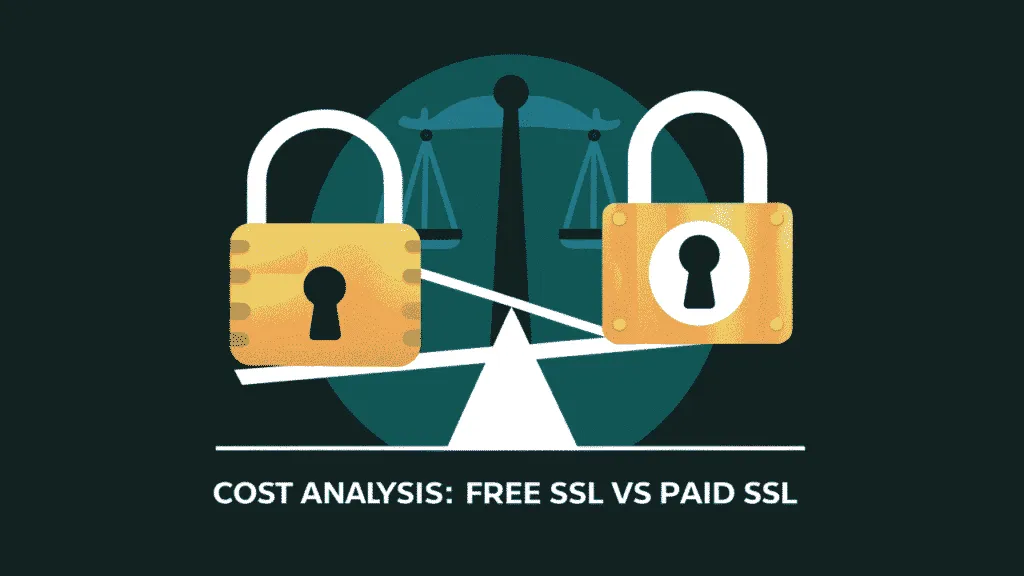
1. Initial Costs: Free vs Paid
One of the biggest differences between free SSL vs paid SSL certificate is the upfront cost. This is especially important for new website owners or small businesses with a limited budget.
Free SSL Certificates:
- Free SSL certificates are completely free to get and use.
- They are offered by non-profit organizations like Let’s Encrypt or ZeroSSL.
- There are no setup or issuance fees.
- Many hosting providers offer free SSL installation with just one click.
- Perfect for personal blogs, portfolios, or anyone just getting started.
Paid SSL Certificates:
- Paid SSL certificates come with a cost depending on the type and level of validation.
- Basic domain validation (DV): ₹500 to ₹2,000/year.
- Organization validation (OV): ₹3,000 to ₹7,000/year.
- Extended validation (EV): ₹8,000 to ₹15,000+/year.
- Additional cost may apply for wildcard or multi-domain options.
- Prices vary by certificate authority (like Sectigo, DigiCert, or Comodo) and included features.
- Paid certificates also come with trust seals, support, and sometimes extra security tools.
So, if you’re just starting out and need basic protection, a free SSL certificate is a good option. But if you’re running a business or handling sensitive data, a paid SSL is worth considering—especially when asking which one is more secure: free SSL vs paid SSL.
2. Long-term Costs: Renewal and Maintenance
When choosing between free SSL vs paid SSL certificate, it’s important to look beyond just the initial cost. Long-term costs like renewals, management, and maintenance can make a big difference over time.
Free SSL Certificates:
- Validity period is short, usually 90 days.
- Needs to be renewed frequently, either manually or through automation (via tools like Certbot).
- If not renewed in time, your website may show security errors.
- May require technical effort to automate renewals.
- No extra cost over time—but does require time and monitoring.
Paid SSL Certificates:
- Validity is longer—typically 1 to 2 years.
- Many providers offer multi-year deals and auto-renewal options.
- No manual renewal needed, which saves time and reduces risks.
- Paid SSL providers also offer customer support, making maintenance easier.
- You pay annually, but you get a hassle-free experience.
So, for someone who wants to “set it and forget it,” a paid SSL is more convenient. But for those with technical knowledge or who use automated tools, free SSL can work just fine. Still, when considering which one is more secure: free SSL vs paid SSL, remember that paid SSL often comes with more reliable support and fewer chances of expiry-related issues.
Installation and Management: Free SSL vs Paid SSL
When setting up SSL on your website, ease of installation and ongoing management are key factors to consider.
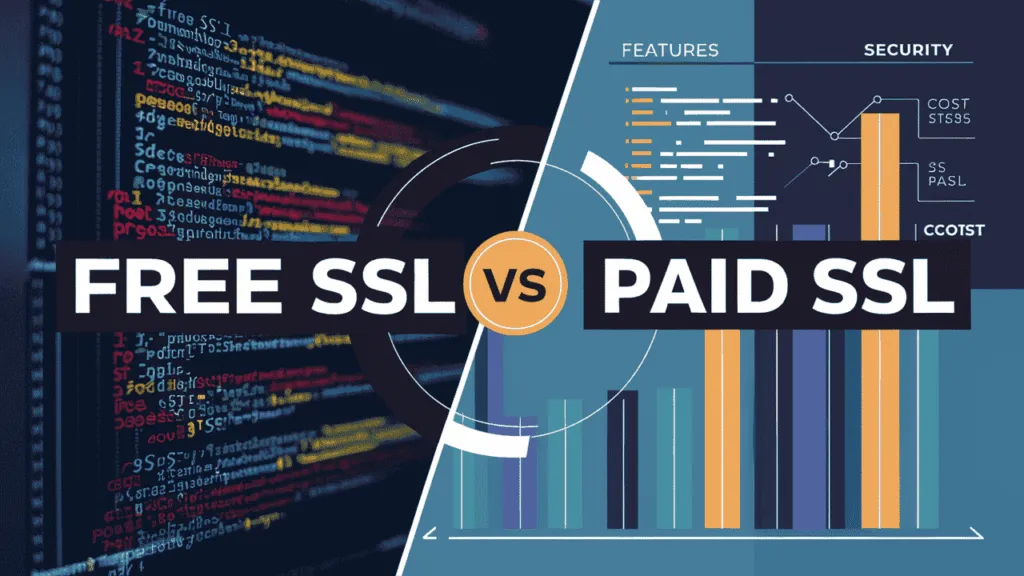
1. Ease of Installation: Free vs Paid
Setting up an SSL certificate can vary greatly depending on whether you choose a free or a paid option. Here’s how both compare:
- Free SSL Certificates:
- Often require manual setup, especially if you’re using self-managed hosting or VPS.
- Tools like Let’s Encrypt may need command-line configuration or cron jobs for renewal.
- Some hosting providers (like Owrbit, Hostinger, etc.) offer one-click installation for free SSL, making the process easier.
- Renewal is usually every 90 days, which can be a hassle if not automated.
- Paid SSL Certificates:
- Usually come with guided setup or automatic installation via your hosting provider or cPanel/DirectAdmin.
- Installation wizards are user-friendly and ideal for beginners.
- Extended Validation (EV) or Organization Validation (OV) SSLs may involve extra verification steps, but providers typically help with this.
- Validity period can be up to 1 year or more, reducing the frequency of renewals.
Free SSL can be easy to install if your host supports automation, but in most cases, paid SSL is simpler, more straightforward, and less time-consuming—especially for beginners or business users.
Support and Documentation: Free vs Paid
When installing or troubleshooting SSL certificates, the level of support you receive can make a big difference. Here’s how free and paid SSL options compare:
- Free SSL Certificates:
- Usually come with basic documentation, often in the form of community forums, GitHub pages, or general guides.
- No dedicated customer support is provided by issuers like Let’s Encrypt.
- If problems arise, you may need to rely on hosting provider support—if they offer help for free SSL—or search through online communities.
- Limited guidance for troubleshooting advanced errors.
- Paid SSL Certificates:
- Comes with full customer support—often 24/7 live chat, email, or even phone assistance.
- Many providers offer installation help, renewal reminders, and hands-on troubleshooting.
- Detailed documentation is available, often tailored to different server types and control panels.
- Premium SSL vendors sometimes provide expert advice for configuring advanced security settings.
Free SSL certificates offer minimal support and rely heavily on community help, while paid SSL certificates come with strong, professional support and thorough documentation—making them a safer choice for businesses and non-technical users.
Performance Metrics: Free SSL vs Paid SSL Certificate
When choosing between free and paid SSL certificates, it’s important to understand how they affect your website’s performance, speed, and user experience.
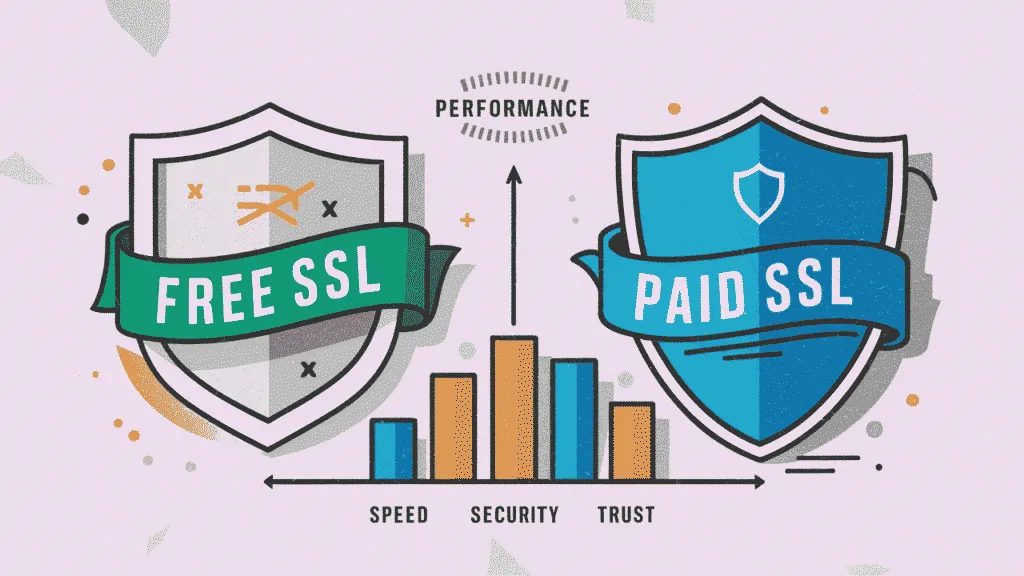
1. Impact on Website Speed :
Both free and paid SSL certificates use the same modern encryption protocols (like TLS 1.2 or TLS 1.3), so their direct impact on website speed is virtually identical. However, the difference lies in the server setup, renewal reliability, and support.
Free SSL Certificate:
- Uses standard TLS encryption, ensuring your website is secure without slowing it down.
- May rely on automated issuance and renewal systems (e.g., Let’s Encrypt), which can occasionally fail or expire without notice, causing temporary site errors.
- Performance depends on your hosting provider’s SSL handling and server configuration.
Paid SSL Certificate:
- Also uses the same TLS encryption standards, so the base speed remains unchanged.
- Often comes with professional setup and reliable auto-renewals, reducing the risk of downtime.
- Some paid providers offer performance enhancements like integration with premium CDNs or optimized certificate chains for faster HTTPS handshakes.
Free and paid SSLs are equal in encryption speed, but paid SSL may offer more reliable uptime and smoother renewals—important for business-critical websites.
2. User Experience and Engagement
An SSL certificate directly impacts how users perceive and interact with your website. While both Free SSL vs Paid SSL Certificate options offer encryption, the difference in visual trust signals and support features can influence user trust and engagement.
Free SSL Certificate:
- Shows the padlock icon in the browser, indicating a secure connection.
- Does not display the organization name or extended validation, which can make some users uncertain about the website’s legitimacy.
- Suitable for blogs, small personal sites, or non-transactional pages where trust concerns are minimal.
Paid SSL Certificate:
- Also shows the padlock icon, but with additional trust indicators in some cases (like Organization Validated or Extended Validation certificates).
- Enhances user trust by verifying the business identity, which is especially useful for eCommerce, banking, or login-based platforms.
- Can increase engagement and conversion rates by making users feel safer while entering sensitive data like passwords or payment details.
If your goal is to build deeper trust, especially with customers who share personal or financial data, a paid SSL provides a more reassuring experience. But for simple informational sites, free SSL can be sufficient.
Conclusion: Final Recommendations for Users
Choosing between a free ssl vs paid SSL certificate ultimately depends on the purpose, scale, and sensitivity of your website.
🔹 Go with Free SSL if:
- You’re running a personal blog, portfolio, or non-commercial project
- You want basic HTTPS encryption for SEO and browser compatibility
- You are comfortable with manual renewals or limited support
- You are testing a site or running a temporary/low-risk website
🔹 Choose Paid SSL if:
- You own a business website, e-commerce store, or membership portal
- You require identity verification (OV/EV certificates) to build customer trust
- You need wildcard or multi-domain coverage
- You want professional support, security warranties, and long-term reliability
In summary, in the Free SSL vs Paid SSL. free SSL works great for simple use cases with basic security needs. But for professional, customer-facing, or high-stakes websites, investing in a paid SSL certificate ensures greater security, credibility, and peace of mind.
If you’re looking to secure your website effectively—whether it’s with a trusted free SSL or a feature-rich paid option—Owrbit can help you get started quickly and affordably.
Checkout How Get A Free SSL Certificate? Why Your Website Needs SSL? 2024
Discover more from Owrbit
Subscribe to get the latest posts sent to your email.
